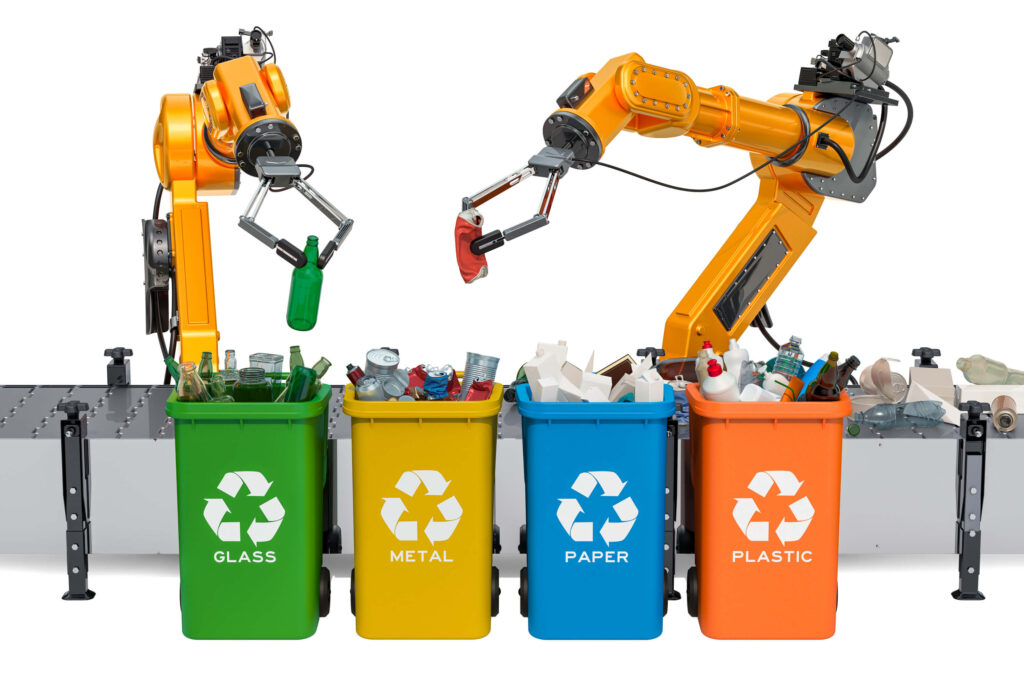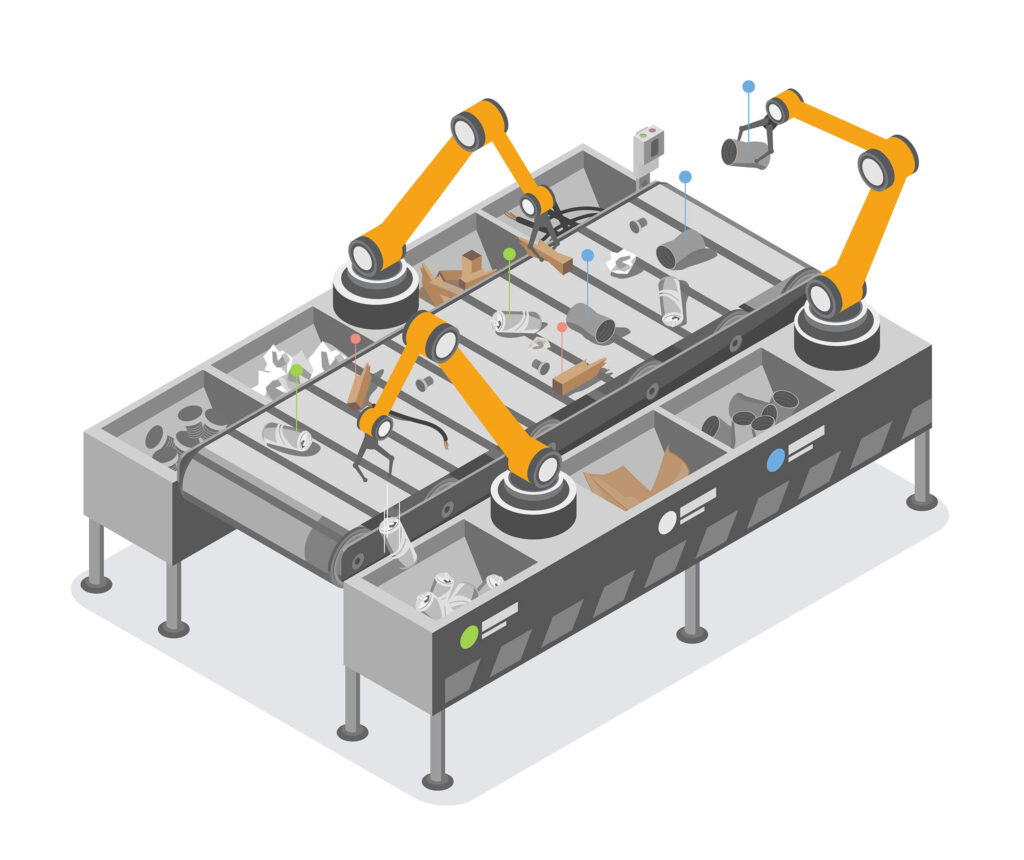

© 2025 Always Buying Scrap! • All Rights Reserved • Website by Chariot
This site protected by reCAPTCHA and the Google Privacy Policy and Term of Service apply.
26 July 2023

The growth of Artificial Intelligence (AI) has accelerated exponentially in recent years due to continuous research and innovation. AI offers businesses numerous advantages, such as reduced costs, new job creation, improved productivity, and better decision-making capabilities.
By 2022, the market size of AI soared to USD 136.55 billion and is forecasted to grow at a CAGR of 37.3% from 2023 to 2030. With its wide range of applications across various industries, such as automotive, healthcare, retail, finance, and manufacturing, AI promises vast opportunities for businesses looking to benefit from this technology. The Scrap Recycling industry is a massive yet technologically underdeveloped sector that has the potential to benefit immensely from AI.
As metal recyclers grapple with the complexities of managing their operations, AI is being used to help make more informed and profitable decisions. AI helps them analyze large volumes of data – including prices, supply and demand, and trade patterns – far faster than any human could do. Recyclers use this data to swiftly identify trends and make accurate predictions about future market conditions that could impact their profits.
Staying ahead of the curve is crucial for achieving success in the metal recycling industry. AI provides recyclers with a powerful tool to gain insights into market sentiment and predict shifts in the market before they happen. By leveraging AI-driven analysis of news articles, social media posts, and other texts related to the industry, recyclers can make proactive decisions that will keep them competitive.
 Over the last several years, the waste management industry has shifted towards automating procedures, starting with the collection process. AI smart bins, for example, use sensors and cameras to monitor waste levels, detect contamination, and optimize collection schedules to improve resource allocation and reduce unnecessary pickups. By learning from historical data through machine learning algorithms, these smart bins can provide valuable insights into waste generation and future demand patterns that would otherwise be impossible to predict, achieving cost savings while also reducing the negative impact on the environment.
Over the last several years, the waste management industry has shifted towards automating procedures, starting with the collection process. AI smart bins, for example, use sensors and cameras to monitor waste levels, detect contamination, and optimize collection schedules to improve resource allocation and reduce unnecessary pickups. By learning from historical data through machine learning algorithms, these smart bins can provide valuable insights into waste generation and future demand patterns that would otherwise be impossible to predict, achieving cost savings while also reducing the negative impact on the environment.
In the past, human error and inefficiency have limited the recycling process. AI technology makes it possible to automate the sorting process with unprecedented accuracy, helping to identify metals quickly and efficiently. AI ensures that recycled products meet quality standards by detecting impurities, measuring material composition, and identifying defects. AI sorting capability improves recycling rates by minimizing contamination and providing higher-quality recycled materials.
Deep Learning is a form of AI that uses multiple layers of deep neural networks to learn from large amounts of data. This advanced technology isolates high-level features from raw input, enabling machines to identify patterns, make decisions, and even create new ideas based on what it has learned. It allows for a high level of recovery and accurate sorting of materials that dwarfs conventional technology. Deep-learning robots analyze materials much in the same way humans do. Using cameras and sensors, they scan the optical signature of recyclable materials by texture, color, material type, and product application. For example, AI can discern between:
It can also differentiate metals and contaminants such as:
Thanks to AI technology, it’s now possible to recover and reuse valuable metals like aluminum, which is currently experiencing a shortage. With AI, recycling facilities can retrieve more materials with higher purity levels, increasing recycling rates and reducing reliance on virgin materials.
Glacier, a San Francisco-based tech company, is developing a cutting-edge AI algorithm that can accurately detect over 90% of recyclable items in waste streams. The company specializes in developing customized solutions that select and sort specific materials.
EverSteel, a promising startup from the University of Tokyo, has focused on automating scrap metal sorting processes using AI. It accomplishes this by using computer vision systems, which can accurately classify scrap metal into over 20 categories and remove unrecyclable alloys and irregular material. These systems help to save precious time and effort for the human workers who come in later to complete the task. EverSteel technology is so innovative that they had to create their own data set to train their models.
EverestLabs, an organization that employs RecycleOS technology, fuses robotics and AI to substantially increase recycling facilities’ material recovery rate. RecycleOS’s cutting-edge AI models can precisely identify nearly indistinguishable objects. When compared with manual sorting, RecycleOS’s robots can perform twice the work in the same span of time.
ZenRobotics‘ Heavy Picker uses specific characteristics like shape or color to identify essential metals such as:
It can also specify objects like:
Scrap metal processing companies like Skrotfrag in Sweden have already employed ZenRobots. Skrotfrag’s sorting line uses Heavy Pickers from ZenRobotics, each with three arms. They stand out as one of the first companies in Sweden to apply robotic sorting technology to scrap metal.
AI robots, like AMP Cortex by AMP Robotics, offer drastic improvements in labor rates. These robots operate at lightning-fast speeds, sorting, picking, and placing materials with up to 120 picks per minute and 99% accuracy rates. Plants adopting the AMP system have reported an impressive 60% rise in labor efficiency and an 11% increase in recyclables capture. The impeccable efficiency of these robots allows them to accomplish in three hours what would take human sorters an entire workday to complete. The operation can accept materials other recycling plants can’t process and keep the whole process in-house. By replacing hard-to-secure human labor for sorting roles, the AMP robots offer facilities unmatched savings of up to 50-70%.
Unlike humans, AI robots can work around the clock, operate continuously without fatigue, and require minimal maintenance. Companies can rely on their consistency to quickly recover high-quality commodities. Robots are flexible machines that can adapt to changes in material streams and commodity prices, making them an essential asset in the recycling industry. With minimal training and refinement, robots can improve their performance over time, becoming more efficient and effective at sorting materials. Additionally, robots can multitask and target a broad range of materials, including challenging or hazardous items that may not be suitable for human workers.
AI and robotics have significantly reduced risks associated with handling hazardous materials at Metal Recycling Facilities (MRFs). Adopting AI in such facilities has also decreased the need for extensive safety training of human operators for working equipment and machinery, thereby reducing training overhead. Moreover, AI technology can help flag potential health and safety issues for operators, such as detecting aerosol bottles, propane and oxygen tanks, batteries, and ammunition, which can explode and cause fires.
MRFs can strategically deploy AI and robotics technologies to optimize their workforce, reallocating human workers to areas where their unique capabilities can add the most value. MRFs can save time and money on manual sorting by replacing lower-value, labor-intensive, or high-risk roles with AI-driven automation, allowing for streamlined operations. In the waste and recycling industry, there is a trend toward reducing the need for humans to work in sorting positions. Instead, the focus is on shifting towards supervisory and maintenance roles, which allows employees to progress into higher-skilled positions.
Companies are currently utilizing AI technology to develop apps that allow for quick categorization and pricing of scrap metal. Integrated Recycling Technologies (IRT) is developing a circuit board classification app to identify and analyze 75 board characteristics, including serial numbers and chip types, to determine their respective categories. As more images are uploaded, the deep-learning capabilities of the system will expand, allowing for a more comprehensive grading of the boards. IRT has enlisted the expertise of external engineers specialized in high-definition cameras, facial recognition software, and deep-learning technology to create a system that automates the grading and valuation process. Although the software was initially created for suppliers, the company will use it to manage its own circuit board sorting system.
Tecnoap, an esteemed company with three decades of expertise in the steel manufacturing industry, recently introduced its own AI software – SCRAPYARD – an innovative web-based platform dedicated to efficiently managing and classifying scrap metal. SCRAPYARD uses AI, sensors, and machine learning technologies to optimize operations on it’s platform. Advanced vision analytics organize different types of scrap metal, verify the weight of truckloads, determine load density, and accurately document the location of unloaded materials. The platform effortlessly generates a comprehensive digital file for each entry, capturing all the necessary details the supplier provides. By harnessing the power of AI, Tecnoap strives to enhance reliability and transparency, ensuring the eradication of fraudulent practices.
According to recent analyses, certain AI units have the potential to achieve breakeven for investment in just under a year, highlighting the tremendous potential for profitability within the scrap metal industry. MRFs can generate significant profits within months following the installation of technologies such as RecycleOS, which streamline the recycling process and greatly enhance efficiency. However, it’s important to note that the payback period for such investments can vary depending on its specific application, for example, its utilization in data analysis, maintenance, or replacing human sorters.
What is Recycling and Composting? Recycling is the process of converting waste...
The Journey of Your Trash: What Happens After You Recycle? Ever wonder what happens to...
In 2023, copper started strong, hitting a $4.35/lb. high. in January. This was followed by a...
What is Recycling and Composting? Recycling is the process of converting waste...
The Journey of Your Trash: What Happens After You Recycle? Ever wonder what happens to...
In 2023, copper started strong, hitting a $4.35/lb. high. in January. This was followed by a...

As a family-owned business, we treat you with integrity and respect.


8:00am to 4:30pm
Last customer will be let in the gate at 4:15pm.
8:00am to 12:00pm
Last customer will be let in the gate at 11:30am.


© 2025 Always Buying Scrap! • All Rights Reserved • Website by Chariot
This site protected by reCAPTCHA and the Google Privacy Policy and Term of Service apply.